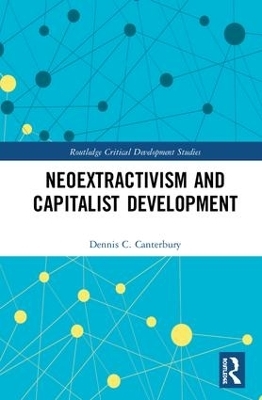
Neoextractivism and Capitalist Development
Seiten
2018
Routledge (Verlag)
978-0-8153-5677-6 (ISBN)
Routledge (Verlag)
978-0-8153-5677-6 (ISBN)
The term neoextractivism was coined to describe how income from natural resources sales can be used for development objectives and to improve the lives of a country's citizens. However, this book argues that neoextractivism is merely another outlet for capitalist development, reinforcing the position of elites, with few benefits for working people.
The large-scale extraction of natural resources for sale in capitalist markets is not a new phenomenon, but in recent years global demand for resources has increased, leading to greater attention to the role of resource extraction in the development of the exporting countries. The term neoextractivism was coined to refer to the complex of state-private sector policies intended to utilize the income from natural resources sales for development objectives and for improving the lives of a country's citizens. However, this book argues that neoextractivism is merely another conduit for capitalist development, reinforcing the position of elites, with few benefits for working people.
With particular reference to the role of neoextractivism within Latin America and the Caribbean, using Guyana as a case study, the book aims to provide readers with the tools they need to critically analyze neoextractivism as a development model, identifying alternative paths for improving the human condition. This book will be of interest to academics and students in the fields of international development, political economy, sociology, and globalization, as well as to policymakers and political activists engaged in social movements in the natural resources sector.
The large-scale extraction of natural resources for sale in capitalist markets is not a new phenomenon, but in recent years global demand for resources has increased, leading to greater attention to the role of resource extraction in the development of the exporting countries. The term neoextractivism was coined to refer to the complex of state-private sector policies intended to utilize the income from natural resources sales for development objectives and for improving the lives of a country's citizens. However, this book argues that neoextractivism is merely another conduit for capitalist development, reinforcing the position of elites, with few benefits for working people.
With particular reference to the role of neoextractivism within Latin America and the Caribbean, using Guyana as a case study, the book aims to provide readers with the tools they need to critically analyze neoextractivism as a development model, identifying alternative paths for improving the human condition. This book will be of interest to academics and students in the fields of international development, political economy, sociology, and globalization, as well as to policymakers and political activists engaged in social movements in the natural resources sector.
Dennis C. Canterbury is a Professor of Sociology at Eastern Connecticut State University, USA
Introduction
Part 1: The Debate on Neoextractivism
1. Neoextractivism and Capitalist Development: An Outline
2. Development Theory and Capitalist Development
3. Extractivism and Neoextractivism
4. Neoextractivism: Myth or Reality
5. Extractive Capitalism, Extractive Imperialism and Imperialism
Part 2: Neoextractivism and Capitalist Centre-Periphery Relations 6. Natural Resources Extraction and Expanded Capitalist Relations
7. The Foundations of Post-Colonial 'New' Extractivism
8. The Post-Colonial Authoritarian State
9. The Criminalized Authoritarian State
10. Political Change and Foreign Intervention
Conclusion
| Erscheinungsdatum | 12.06.2018 |
|---|---|
| Reihe/Serie | Routledge Critical Development Studies |
| Verlagsort | New York |
| Sprache | englisch |
| Maße | 156 x 234 mm |
| Gewicht | 498 g |
| Themenwelt | Sozialwissenschaften ► Ethnologie |
| Sozialwissenschaften ► Politik / Verwaltung | |
| Sozialwissenschaften ► Soziologie ► Spezielle Soziologien | |
| Wirtschaft ► Volkswirtschaftslehre | |
| ISBN-10 | 0-8153-5677-3 / 0815356773 |
| ISBN-13 | 978-0-8153-5677-6 / 9780815356776 |
| Zustand | Neuware |
| Haben Sie eine Frage zum Produkt? |
Mehr entdecken
aus dem Bereich
aus dem Bereich
eine Einführung
Buch | Softcover (2024)
De Gruyter Oldenbourg (Verlag)
29,95 €


